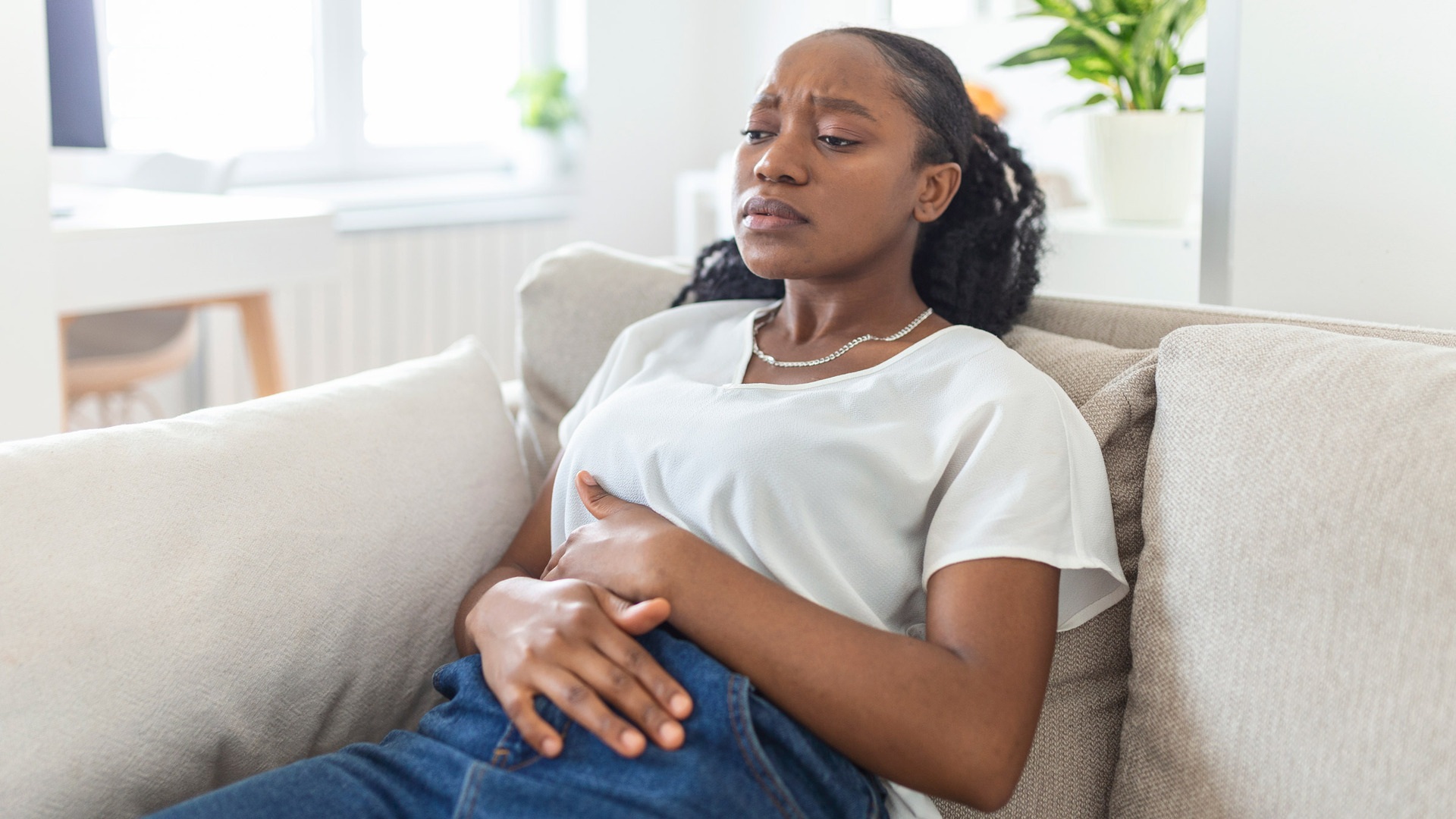

FAQs
Why Do I Fart So Much On My Period
Published: July 31, 2023
Experiencing excessive flatulence during your period? Get answers to general questions about why you fart more during menstruation.
(Many of the links in this article redirect to a specific reviewed product. Your purchase of these products through affiliate links helps to generate commission for Under-tec.com, at no extra cost. Learn more)
Table of Contents
- Introduction
- Understanding the Menstrual Cycle
- Hormonal Changes during Menstruation
- Gas and Bloating during Menstruation
- Increased Flatulence on Period: Causes
- Effects of Prostaglandins on the Digestive System
- Remedies to Reduce Flatulence during Menstruation
- Dietary Changes to Reduce Gas during Periods
- Managing Gas and Bloating during Periods
- Conclusion
Introduction
Have you ever noticed that you seem to pass more gas during your period? You’re not alone. Many women experience an increase in flatulence during menstruation, and it can be quite uncomfortable and embarrassing. But why does this happen? Is there a scientific explanation behind it?
To understand why some women fart more during their period, it’s important to have a basic understanding of the menstrual cycle. The menstrual cycle is a monthly process that prepares a woman’s body for potential pregnancy. It involves hormonal changes that regulate the release of an egg from the ovaries, the thickening of the uterine lining, and the shedding of this lining if fertilization does not occur.
During the menstrual cycle, the levels of estrogen and progesterone in a woman’s body fluctuate. These hormonal changes not only affect the reproductive system but also have an impact on other parts of the body, including the digestive system. This is why many women experience gastrointestinal symptoms such as bloating, constipation, and yes, increased flatulence, during their period.
So, what exactly causes gas and bloating during menstruation? One of the main culprits is the hormone prostaglandin. Prostaglandins are chemicals released by the uterus during menstruation to help the muscles contract and shed the uterine lining. Unfortunately, prostaglandins can also affect the digestive system, leading to increased gas production, bloating, and even diarrhea in some cases.
While passing gas during your period is a normal bodily function, it can still be quite uncomfortable and embarrassing. However, there are ways to manage this issue and reduce the discomfort associated with increased flatulence. By making a few dietary changes, practicing relaxation techniques, and taking over-the-counter medications if necessary, you can alleviate gas and bloating during your period.
In this article, we will delve deeper into the causes of increased flatulence during menstruation, the effects of prostaglandins on the digestive system, and the remedies and dietary changes that can help reduce gas and bloating during your period. So, let’s get started and find out why you might be farting more than usual when Aunt Flo comes to visit!
Understanding the Menstrual Cycle
The menstrual cycle is an intricate process that occurs in a woman’s body, typically lasting around 28 days. It involves several hormonal changes and physiological events that prepare the reproductive system for potential pregnancy.
The menstrual cycle can be divided into four phases: the menstruation phase, follicular phase, ovulation, and luteal phase. Each phase has specific characteristics and is regulated by various hormones.
1. Menstruation Phase:
This is the first phase of the menstrual cycle and typically lasts 3 to 7 days. During this time, the uterus sheds its lining, resulting in the flow of blood and tissue through the vagina. This phase is characterized by low levels of estrogen and progesterone.
2. Follicular Phase:
The follicular phase begins on the first day of menstruation and lasts until ovulation. The pituitary gland releases follicle-stimulating hormone (FSH), which signals the ovaries to start developing follicles. Within the follicles, eggs mature and estrogen levels gradually increase, causing the uterine lining to thicken.
3. Ovulation:
Ovulation usually occurs around the mid-point of the menstrual cycle, approximately 14 days before the start of the next menstruation. During ovulation, a mature egg is released from one of the ovaries into the fallopian tube. This process is triggered by a surge in luteinizing hormone (LH).
4. Luteal Phase:
After ovulation, the ruptured follicle in the ovary forms a structure called the corpus luteum. The corpus luteum produces progesterone, which prepares the uterine lining for potential implantation of a fertilized egg. If fertilization does not occur, the corpus luteum degenerates, causing a drop in progesterone levels.
If pregnancy does not occur, the menstrual cycle starts anew with the menstruation phase.
Understanding the menstrual cycle is essential because hormonal changes that occur during this process can have a widespread impact on the body, including the digestive system. These hormonal fluctuations can lead to various gastrointestinal symptoms, including gas and bloating.
In the next section, we will explore how hormonal changes during menstruation can contribute to increased flatulence and discomfort. So, let’s dive deeper into the effects of hormonal changes on the body!
Hormonal Changes during Menstruation
During menstruation, a woman’s body goes through significant hormonal changes that have far-reaching effects. These hormonal fluctuations can impact various bodily systems, including the reproductive system and the digestive system.
The main hormones involved in the menstrual cycle are estrogen and progesterone. Estrogen is responsible for the growth and development of the uterine lining, while progesterone helps maintain the uterine lining and prepares it for potential implantation of a fertilized egg.
At the start of the menstrual cycle, estrogen and progesterone levels are relatively low. As the cycle progresses and the follicles in the ovaries develop, estrogen levels gradually increase. This rise in estrogen stimulates the thickening of the uterine lining in preparation for a fertilized egg.
However, if fertilization does not occur, the corpus luteum, which is formed from the ruptured follicle after ovulation, begins to degenerate. As a result, progesterone levels drop, causing the uterine lining to shed during menstruation.
These hormonal changes can impact the digestive system, leading to gastrointestinal symptoms such as bloating, constipation, and increased flatulence. Estrogen has been found to affect the motility of the gastrointestinal tract, slowing down the movement of food through the system and potentially causing bloating and constipation.
In addition, fluctuating hormone levels can affect the balance of bacteria in the gut, leading to changes in digestion and potentially increased gas production. This can manifest as increased flatulence during menstruation.
Furthermore, prostaglandins, which are hormone-like substances produced by the uterus during menstruation, can also impact the digestive system. Prostaglandins help facilitate uterine contractions to shed the lining, but they can also affect the smooth muscles of the digestive tract. This can lead to increased intestinal contractions, bloating, and even diarrhea.
The hormonal changes that occur during menstruation differ from woman to woman, and not all women experience the same degree of gastrointestinal symptoms. Some may have mild discomfort, while others may experience severe bloating and gastrointestinal distress.
In the next section, we will explore in more detail the connection between hormonal changes during menstruation and increased flatulence. We will dive into the effects of prostaglandins on the digestive system and understand why some women fart more during their period. So, let’s continue our journey!
Gas and Bloating during Menstruation
Gas and bloating are common complaints among women during menstruation. Many factors contribute to these uncomfortable symptoms, including hormonal changes, prostaglandins, and changes in digestion. Understanding the causes can help women better manage and alleviate gas and bloating during their period.
One of the main reasons for increased gas and bloating during menstruation is the fluctuation of hormones, particularly estrogen and progesterone. These hormones can affect the motility of the gastrointestinal tract, slowing down digestion and causing food to stay in the intestines longer. This delay in digestion can result in the production of more gas, leading to bloating and discomfort.
In addition to hormonal changes, prostaglandins play a significant role in gas and bloating during menstruation. Prostaglandins are hormone-like substances released by the uterus to facilitate the shedding of the uterine lining. Unfortunately, they can also affect the smooth muscles of the digestive tract, causing increased contractions and leading to bloating and gas.
Furthermore, changes in diet and eating patterns during menstruation can contribute to gas and bloating. Many women experience food cravings or changes in appetite during their period, which can result in consuming more gas-producing foods. Common culprits include carbonated beverages, beans, cruciferous vegetables (such as broccoli and cabbage), and high-fiber foods. These foods can be harder to digest and may produce more gas, exacerbating bloating and discomfort.
It is important to note that the severity of gas and bloating during menstruation may vary from woman to woman. Some may only experience mild discomfort, while others may have more pronounced symptoms. It is essential to listen to your body and identify any specific triggers that worsen your gas and bloating.
Despite the discomfort, there are measures you can take to manage and reduce gas and bloating during your period. We will explore some remedies and dietary changes in the following section that can help alleviate these symptoms. By making a few adjustments to your lifestyle and eating habits, you can minimize the impact of gas and bloating on your menstrual cycle.
Now that we have a better understanding of why gas and bloating occur during menstruation, let’s discover some practical solutions to help alleviate these symptoms. So, keep reading to find out how you can find relief!
Increased Flatulence on Period: Causes
Experiencing increased flatulence during your period can be uncomfortable and often embarrassing. However, there are several factors that contribute to this phenomenon. Let’s explore some of the main causes of increased flatulence during menstruation.
1. Hormonal changes: During your period, hormonal fluctuations, especially changes in estrogen and progesterone levels, can affect the digestive system. These hormonal changes can slow down digestion and lead to the production of gas, resulting in increased flatulence.
2. Prostaglandins: The release of prostaglandins during menstruation, which helps with uterine contractions to shed the lining, can also affect the digestive system. Prostaglandins can cause increased contractions of the smooth muscles in the intestines, leading to gas and bloating, and subsequently increased flatulence.
3. Changes in digestion: Some women experience changes in digestion during their period, which can contribute to increased flatulence. This can be due to alterations in the gut microbiota, the balance of bacteria in the intestines, or changes in the motility of the gastrointestinal tract.
4. Diet: What you eat can have a significant impact on your digestion and flatulence levels. Consuming gas-producing foods, such as beans, lentils, cruciferous vegetables, carbonated beverages, and high-fiber foods, can increase flatulence. Women may experience increased cravings or changes in eating patterns during their period, leading to the consumption of gas-inducing foods.
5. Swallowing air: Another factor that contributes to increased flatulence during menstruation is swallowing air. This can happen when you eat too quickly, chew gum, drink through a straw, or talk while eating. Swallowed air can accumulate in the digestive tract and result in increased flatulence.
6. Stress and anxiety: Hormonal changes during menstruation can also impact mood and emotions. Stress and anxiety can affect digestion and contribute to increased flatulence.
It’s important to remember that everyone’s body is different, and what causes increased flatulence during menstruation for one person may not be the same for another. Keeping a food diary and tracking your symptoms can help identify specific triggers that exacerbate flatulence during your period.
In the next section, we will explore various remedies and dietary changes that can be implemented to reduce gas and flatulence during menstruation. By making simple lifestyle adjustments and adopting healthier eating habits, you can minimize the discomfort and embarrassment associated with increased flatulence.
Effects of Prostaglandins on the Digestive System
Prostaglandins are hormone-like substances that play a crucial role in various physiological processes, including inflammation, blood flow regulation, and uterine contractions during menstruation. However, prostaglandins can also impact the digestive system, causing a range of gastrointestinal symptoms, including gas and bloating.
During menstruation, the uterus releases prostaglandins to initiate uterine contractions, helping shed the lining. Unfortunately, these prostaglandins can also affect the smooth muscles of the digestive tract, leading to several effects on the digestive system:
1. Increased intestinal contractions: Prostaglandins can stimulate increased contractions of the intestinal muscles, causing the food to move more rapidly through the digestive tract. This increased motility can lead to gas, bloating, and potentially diarrhea in some individuals. It is worth noting that the effects of prostaglandins vary from person to person, and not all women will experience these symptoms.
2. Stimulation of pain receptors: Prostaglandins can activate pain receptors in the intestines, leading to discomfort and cramping. This can contribute to the overall discomfort felt by some women during their period, including gastrointestinal symptoms like flatulence.
3. Inflammation: Prostaglandins have pro-inflammatory properties and can promote inflammation in the digestive tract. This inflammation can disturb the normal functioning of the gastrointestinal system, causing bloating, gas, and other digestive issues.
It is important to note that not all women experience the same degree of prostaglandin-related symptoms during their period. Some may have mild discomfort, while others may experience more pronounced gastrointestinal symptoms.
Managing the effects of prostaglandins on the digestive system can help reduce gas and bloating during menstruation. Engaging in relaxation techniques, such as deep breathing exercises, yoga, or meditation, can help alleviate muscle contractions and reduce discomfort caused by prostaglandins. Applying a heating pad or taking a warm bath can also help relax the abdominal muscles and provide relief.
Additionally, over-the-counter nonsteroidal anti-inflammatory drugs (NSAIDs) can help reduce the production of prostaglandins and alleviate the associated gastrointestinal symptoms. However, it is recommended to consult with a healthcare provider before starting any medication.
In the following section, we will explore various remedies and dietary changes that can be employed to reduce gas and bloating during menstruation. By making simple lifestyle adjustments and adopting a mindful approach to eating, you can effectively manage the effects of prostaglandins and have a more comfortable period experience.
Remedies to Reduce Flatulence during Menstruation
Experiencing increased flatulence during menstruation can be uncomfortable and embarrassing. However, there are several remedies you can try to reduce gas and bloating during this time. By making a few lifestyle changes and incorporating some simple strategies, you can find relief and enjoy a more comfortable period. Here are some remedies to consider:
1. Mindful eating: Pay attention to your eating habits and adopt mindful eating practices. Chew your food thoroughly, eat slowly, and avoid swallowing air. This can help minimize the amount of gas you swallow and reduce the likelihood of flatulence.
2. Monitor your diet: Keep a food diary and take note of foods that worsen your flatulence symptoms during menstruation. Gas-inducing foods such as beans, lentils, cabbage, broccoli, carbonated beverages, and high-fiber foods may contribute to increased gas production. Limiting these foods or finding alternatives can alleviate flatulence.
3. Stay hydrated: Drinking plenty of water can help promote healthy digestion and prevent constipation, which can contribute to gas and bloating during your period. Aim for at least 8 cups (64 ounces) of water per day.
4. Dietary changes: Consider incorporating foods that can help reduce gas and bloating. Peppermint tea, ginger, chamomile tea, and fennel seeds have been traditionally used to soothe the digestive system and alleviate flatulence. However, individual responses may vary, so listen to your body and determine what works best for you.
5. Regular exercise: Engaging in regular physical activity can help stimulate digestion and reduce bloating and flatulence. Light exercises like walking, yoga, or gentle stretching can be beneficial during your period. However, it’s important to listen to your body and avoid strenuous activities if you’re not feeling up to it.
6. Over-the-counter remedies: Certain over-the-counter medications, such as simethicone, can help reduce gas and alleviate bloating. These medications work by breaking down gas bubbles in the digestive system, making it easier for the body to eliminate excess gas. However, it’s advisable to consult with a healthcare professional before using any medications.
Remember, what works for one person may not work for another. It’s important to experiment with different remedies and strategies to find what provides you with the most relief. If your symptoms persist or worsen, it’s recommended to seek guidance from a healthcare provider for proper evaluation and advice.
By implementing these remedies and making conscious choices regarding your diet and lifestyle, you can effectively reduce flatulence during your period and experience greater comfort and confidence. Now, let’s move on to the next section where we will explore specific dietary changes that can help alleviate flatulence during menstruation.
Dietary Changes to Reduce Gas during Periods
Making certain dietary changes can have a significant impact on reducing gas and bloating during your period. By being mindful of what you eat and incorporating specific foods into your diet, you can minimize flatulence and improve your overall digestive health. Here are some dietary changes to consider:
1. Increase fiber gradually: Consuming a diet rich in fiber promotes regular bowel movements and helps prevent constipation, which can contribute to gas and bloating. However, it’s important to increase your fiber intake gradually to allow your body to adjust. Opt for high-fiber foods like fruits, vegetables, whole grains, and legumes. Remember to drink plenty of water alongside increased fiber consumption to avoid potential digestive discomfort.
2. Limit gas-producing foods: Some foods are notorious for causing gas and bloating. Consider reducing your intake of carbonated beverages, beans, lentils, broccoli, cabbage, onions, and certain fruits like apples and pears. These foods can be harder to digest and may contribute to increased flatulence during menstruation.
3. Avoid fatty and fried foods: High-fat foods can slow down digestion and lead to bloating and discomfort. Opt for lean protein sources like chicken, fish, and tofu, and include healthy fats from sources like avocados, nuts, and seeds. Aim for a balanced diet that includes a variety of nutrient-dense foods.
4. Be mindful of lactose and gluten: Some women may have lactose or gluten intolerances that can contribute to digestive issues, including flatulence. Pay attention to how your body reacts to dairy products and gluten-containing foods. If you suspect any intolerances, consider reducing or eliminating these from your diet during your period to see if it alleviates your symptoms.
5. Cook vegetables and legumes thoroughly: Cooking vegetables and legumes can make them easier to digest. Steaming or sautéing them can help break down some of the fibers that can lead to gas production during digestion. If you prefer eating raw vegetables, start with small portions and gradually increase as your body adapts.
6. Stay hydrated: Drinking plenty of water throughout the day is essential for maintaining healthy digestion. Water helps soften stools and promote regular bowel movements, reducing the likelihood of constipation and associated gas buildup.
Remember that everyone’s body is unique, so it’s important to listen to your own digestive system and identify specific trigger foods that worsen your flatulence. Keeping a food diary can be helpful in identifying patterns and making informed adjustments to your diet during your period.
By making these dietary changes and adopting a mindful approach to eating, you can effectively reduce gas and bloating during your period. In the next section, we will explore additional management strategies to help you deal with gas and bloating more effectively during menstruation. So, let’s continue our journey!
Managing Gas and Bloating during Periods
Dealing with gas and bloating during your period can be challenging, but there are effective strategies to help manage these symptoms. By incorporating these management techniques into your routine, you can minimize discomfort and enjoy a more pleasant period experience. Here are some tips for managing gas and bloating:
1. Regular exercise: Engaging in regular physical activity can help stimulate digestion and reduce bloating and gas. Light exercises like walking, yoga, or gentle stretching can be particularly beneficial during your period. Exercise can also help alleviate cramps and improve overall mood and well-being.
2. Relaxation techniques: Stress and anxiety can exacerbate digestive symptoms. Incorporate relaxation techniques such as deep breathing exercises, meditation, and mindfulness to reduce stress levels. These techniques can help relax the gastrointestinal muscles and alleviate gas and bloating.
3. Heat therapy: Applying a heating pad or using a hot water bottle on your abdomen can help relax the muscles and provide relief from bloating and discomfort. Heat has a soothing effect on the digestive system, promoting muscle relaxation and relieving gas buildup.
4. Avoid tight clothing: Wearing tight-fitting clothes, especially around the waist, can put pressure on your abdomen and contribute to bloating and discomfort. Opt for loose, comfortable clothing during your period to allow your digestive system more freedom to function properly.
5. Over-the-counter remedies: There are various over-the-counter treatments available to alleviate gas and bloating symptoms. Antacids or simethicone-based medications can help break down gas bubbles in the digestive system and relieve discomfort. However, it’s always a good idea to consult with a healthcare professional before starting any new medication.
6. Herbal teas: Certain herbal teas, such as peppermint, ginger, chamomile, and fennel, have been used for centuries to aid digestion and reduce bloating. Sipping on a cup of herbal tea can provide gentle relief and promote relaxation of the gastrointestinal muscles.
7. Probiotics: Probiotics are beneficial bacteria that can help improve gut health and promote healthy digestion. Adding probiotic-rich foods, such as yogurt, kefir, sauerkraut, and kimchi, to your diet can help maintain a healthy balance of bacteria in your digestive system, potentially reducing gas and bloating.
Remember, finding the right management strategies for your gas and bloating may require some trial and error. It’s important to listen to your body, be patient, and give yourself time to understand what works best for you. If your symptoms persist or worsen, it’s always advisable to seek guidance from a healthcare professional for a thorough evaluation and personalized advice.
By implementing these management techniques, you can effectively reduce gas and bloating during your period and improve your overall comfort and well-being. Now, armed with these strategies, you can approach your next period with confidence and ease.
Conclusion
Experiencing increased flatulence during your period can be uncomfortable and embarrassing, but it is a common occurrence among many women. Understanding the reasons behind this phenomenon can help you navigate through this time with greater comfort and confidence.
The menstrual cycle brings about hormonal changes that can impact the digestive system. Fluctuations in estrogen and progesterone levels can slow down digestion and contribute to increased gas production. Additionally, prostaglandins released during menstruation can lead to increased contractions in the intestines, leading to bloating and gas.
Fortunately, there are various remedies and strategies to alleviate gas and bloating during your period. Mindful eating, dietary changes, regular exercise, relaxation techniques, and heat therapy can all be effective in managing these symptoms. Over-the-counter remedies, herbal teas, and probiotics can also provide relief. It’s important to listen to your body, identify trigger foods, and make personalized adjustments to your diet and lifestyle.
Remember, what works for one person may not work for another, so it may take some experimentation to find the strategies that work best for you. If symptoms persist or worsen, it is always wise to consult with a healthcare professional for further evaluation and guidance.
By implementing these strategies and being attuned to your body’s needs, you can effectively reduce gas and bloating during your period, allowing you to experience greater comfort and ease. With a little effort and awareness, you can navigate through your period with confidence and minimal discomfort, embracing the natural processes of your body.










